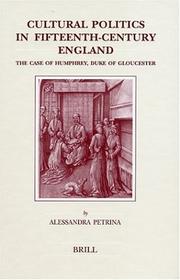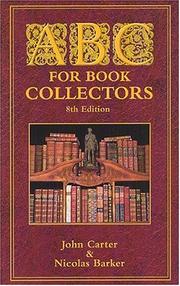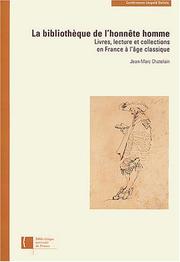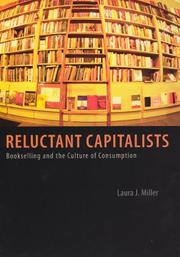| Listing 1 - 10 of 14 | << page >> |
Sort by
|
Book
ISBN: 1536113239 9781536113235 9781604566260 1604566264 Year: 2012 Publisher: Hauppauge, N.Y. Lancaster
Abstract | Keywords | Export | Availability | Bookmark
 Loading...
Loading...Choose an application
- Reference Manager
- EndNote
- RefWorks (Direct export to RefWorks)
Bibliomania. --- Book collecting. --- Bibliophily --- Books --- Book selection --- Collectors and collecting --- Antiquarian booksellers --- Bibliomania --- Book collecting
Book
ISBN: 0815650833 9780815650836 9780815610069 0815610068 Year: 2012 Publisher: Syracuse, New York
Abstract | Keywords | Export | Availability | Bookmark
 Loading...
Loading...Choose an application
- Reference Manager
- EndNote
- RefWorks (Direct export to RefWorks)
Counterculture --- Bookstores --- Paperbacks --- Pacifists --- Booksellers and bookselling --- Book shops --- Book stores --- Bookshops --- Specialty stores --- Antiquarian booksellers --- Bibliography --- Paper backs --- Paper-books --- Paper-bounds --- Paper-covers --- Paperback books --- Paperbooks --- Paperbounds --- Soft-covers --- Softbound books --- Softcovers --- Books --- Book sales --- Book industries and trade --- Publishers and publishing --- History --- History. --- Publishing --- Paperback editions --- Kepler, Roy C. --- Friends and associates --- Kepler's Books --- Book dealers --- Dealers, Book

ISBN: 9004137130 9786610914883 9047404904 1280914882 1429414766 9781429414760 9789004137134 9789047404903 9781280914881 6610914885 Year: 2004 Volume: 124 Publisher: Leiden, Netherlands Boston Brill
Abstract | Keywords | Export | Availability | Bookmark
 Loading...
Loading...Choose an application
- Reference Manager
- EndNote
- RefWorks (Direct export to RefWorks)
This volume is an analysis of the development of cultural politics in Lancastrian England. It focusses on Duke Humphrey of Gloucester, brother of Henry V and Protector of England during Henry VI's minority. Humphrey's intellectual activity conformed itself to the Duke's own position in the kingdom: the book explores Humphrey's commission of biographies, translations of Latin texts, political pamphlets and poems, as well as his collection of manuscripts acquired both in England and from Italian humanists. Particular attention is dedicated to Humphrey's donations to the University of Oxford and to his relations with English poets and translators, such as John Lydgate and Thomas Hoccleve, highlighting his contribution towards the making of the nation's cultural autonomy.
Humphrey --- Authors and patrons --- England --- History --- To 1500 --- Book collecting --- Literary patrons --- Great Britain --- Biography --- Nobility --- Humanists --- Lancaster and York, 1399-1485 --- Politics and government --- 1399-1485 --- Intellectual life --- 1066-1485 --- Benefactors --- Bibliophily --- Books --- Book selection --- Collectors and collecting --- Antiquarian booksellers --- Bibliomania --- Literary patronage --- Maecenatism --- Patronage of literature --- Sponsorship of literature --- Art patronage --- Literature and state --- Humphrey, --- Humfrey, --- Unfredo, --- Plantagenet, Humphrey, --- Humphrey, duc de Gloucester, 1391-1447 --- HUMANISME --- ANGLETERRE --- Et la culture --- 15E SIECLE --- VIE INTELLECTUELLE
Book
ISSN: 12428671 ISBN: 2271063922 2271078199 9782271063922 Year: 2006 Publisher: CNRS Éditions
Abstract | Keywords | Export | Availability | Bookmark
 Loading...
Loading...Choose an application
- Reference Manager
- EndNote
- RefWorks (Direct export to RefWorks)
En proposant d'appréhender les populations musulmanes de France par le biais du livre islamique et de ses circuits de distribution, cet ouvrage offre une lecture nouvelle et pertinente de l'islam hexagonal. L'ouverture de librairies islamiques comme la prolifération des points de vente plus informels d'ouvrages portant sur la pratique religieuse musulmane dans les quartiers parisiens de la Goutte d'Or et de la Folie Méricourt datent du milieu des années 1980. Ce phénomène, que l'auteur décrit et analyse en détail, offre la matière à une véritable sociologie urbaine de ces quartiers traditionnellement dévolus à l'accueil des migrants dans l'espace parisien. L'apparition des librairies signale l'aboutissement du processus d'installation pérenne et de communautarisation dans des espaces faussement perçus comme abandonnés et marginalisés. Qui sont cependant les clients fréquentant les librairies ? Quelle relation les lecteurs entretiennent-ils avec le livre islamique ? Quelles sont les motivations conduisant à l'acquisition d'ouvrages mais aussi d'objets en relation à l'islam ? Pour répondre à ces questions, l'auteur s'est livré à une véritable enquête portant sur les catalogues, les thèmes, les auteurs mais aussi les réseaux de distribution, du Beyrouth des années 1980-1990 à la naissance d'une imprimerie islamique parisienne. Cette sociologie historique des réseaux de production du livre s'achève au moment où les indices d'une crise de la demande deviennent manifestes. Comment expliquer cette crise ? Quelle recomposition annonce-t-elle ? Et surtout, que nous dit-elle sur les dynamiques de l'islam en France ? L'auteur livre sur ce point un faisceau d'analyses fort documentées qui sont bien loin des idées reçues.
Muslims --- Bookstores --- Islam --- Books and reading --- Booksellers and bookselling --- Islamic literature --- Libraires et librairie --- Littérature islamique --- Religion --- Islam. --- Book shops --- Book stores --- Bookshops --- Specialty stores --- Antiquarian booksellers --- Mohammedans --- Moors (People) --- Moslems --- Muhammadans --- Musalmans --- Mussalmans --- Mussulmans --- Mussulmen --- Religious adherents --- Religion, Primitive --- Atheism --- Irreligion --- Religions --- Theology --- Mohammedanism --- Muhammadanism --- Muslimism --- Mussulmanism --- Muslims - Books and reading - France - Paris --- Bookstores - France - Paris --- Islam - France - Paris --- Folie Méricourt --- livre islamique --- Seine-Saint-Denis --- librairies islamiques --- islam en France --- Goutte d’Or --- Paris
Book
ISBN: 9780226781716 0226781712 0226781704 9786611966614 1281966614 0226781720 9780226781709 9780226781723 9781281966612 6611966617 Year: 2008 Publisher: Chicago University of Chicago Press
Abstract | Keywords | Export | Availability | Bookmark
 Loading...
Loading...Choose an application
- Reference Manager
- EndNote
- RefWorks (Direct export to RefWorks)
In Jennifer Summit's account, libraries are more than inert storehouses of written tradition; they are volatile spaces that actively shape the meanings and uses of books, reading, and the past. Considering the two-hundred-year period between 1431, which saw the foundation of Duke Humfrey's famous library, and 1631, when the great antiquarian Sir Robert Cotton died, Memory's Library revises the history of the modern library by focusing on its origins in medieval and early modern England. Summit argues that the medieval sources that survive in English collections are the product of a Reformation and post-Reformation struggle to redefine the past by redefining the cultural place, function, and identity of libraries. By establishing the intellectual dynamism of English libraries during this crucial period of their development, Memory's Library demonstrates how much current discussions about the future of libraries can gain by reexamining their past.
Book collecting --- Books and reading --- Libraries --- Reformation --- History. --- History --- England --- Intellectual life --- Book history --- anno 1500-1799 --- anno 1400-1499 --- 02 <09> <41> --- 02 <09> <41> Bibliotheekwezen:--algemene geschiedenis--Verenigd Koninkrijk van Groot-Brittannië en Noord-Ierland --- Bibliotheekwezen:--algemene geschiedenis--Verenigd Koninkrijk van Groot-Brittannië en Noord-Ierland --- libraries [object groupings] --- bookstocks --- manuscripts [documents] --- Bibliophily --- Books --- Book selection --- Collectors and collecting --- Antiquarian booksellers --- Bibliomania --- English Reformation --- Documentation --- Public institutions --- Librarians --- medieval, middle ages, time period, era, early modern, england, britain, uk, united kingdom, europe, european, western, memory, remembrance, remembering, academic, scholarly, research, history, historical, libraries, books, reading, written, tradition, past, 1400s, 1500s, 1600s, antiquarian, robert cotton, reformation, post, intellectual, humanism, evidence, reformer.
Book
ISBN: 9781421421346 9781421421353 1421421356 1421421348 Year: 2017 Publisher: Baltimore Johns Hopkins University Press
Abstract | Keywords | Export | Availability | Bookmark
 Loading...
Loading...Choose an application
- Reference Manager
- EndNote
- RefWorks (Direct export to RefWorks)
In Poetic Modernism in the Culture of Mass Print, Bartholomew Brinkman argues that an emerging mass print culture conditioned the production, reception, and institutionalization of poetic modernism from the latter part of the nineteenth century through the middle of the twentieth century-with lasting implications for the poetry and media landscape. Drawing upon extensive archival research in the United States and Britain, Brinkman demonstrates that a variety of print collecting practices-including the anthology, the periodical, the collage poem, volumes of selected and collected poems, and the modern poetry archive-helped structure key formal and institutional sites of poetic modernism.Brinkman focuses on the generative role of book collecting practices and the negotiation of print ephemera in scrapbooks. He also traces the evolution of the modern poetry archive as a particular case of the mid-twentieth-century rise of literary archives and identifies parallels between the beginning of mass print culture at the end of the nineteenth century and the growth of digital culture today. Advocating for a transatlantic modernism that stretches roughly from 1880 to 1960-one that incorporates both popular and canonical poets-Brinkman successfully extends the geographical, historical, and vertical dimensions of modernist studies.Poetic Modernism in the Culture of Mass Print will appeal not only to scholars and students of literary modernism, modern periodical studies, book history, print culture, media studies, history, art history, and museum studies but also to librarians, archivists, museum curators, and information science professionals.
Poetics --- English poetry --- American poetry --- Publishers and publishing --- Modernism (Literature) --- Mass media and literature --- Book collecting --- History and criticism --- ANTIQUES & COLLECTIBLES / Books. --- American poetry. --- Book collecting. --- English poetry. --- LITERARY CRITICISM / Semiotics & Theory. --- Mass media and literature. --- Modernism (Literature). --- Poetics. --- Publishers and publishing. --- 1900-1999. --- Great Britain. --- United States. --- History and criticism. --- Bibliophily --- Books --- Book publishing --- Poetry --- Literature and mass media --- Collectors and collecting --- Publishing --- Technique --- Book selection --- Antiquarian booksellers --- Bibliomania --- Book industries and trade --- Booksellers and bookselling --- Literature --- ANTIQUES & COLLECTIBLES / Books --- LITERARY CRITICISM / Semiotics & Theory --- E-books

ISBN: 1584561122 9781584561125 0712348220 Year: 2006 Publisher: New Castle Oak Knoll press
Abstract | Keywords | Export | Availability | Bookmark
 Loading...
Loading...Choose an application
- Reference Manager
- EndNote
- RefWorks (Direct export to RefWorks)
Eighth edition, completely revised and re-set, with additional information and an Introduction by Nicolas Barker. Shaken, Unsophisticated, Harleian Style, Fingerprint, E-book, Dentelle. Can you define these terms? If not, this is the book for you! John Carter's ABC For Book Collectors has long been established as the most enjoyable as well as the most informative reference book on the subject. Here, in over 490 alphabetical entries, ranging in length from a single line to several pages, may be found definition and analysis of the technical terms used in book collecting and bibliography, interspersed with salutary comments on such subjects as auctions, condition, facsimiles and fakes, 'points', rarity, etc. This eighth edition has been revised by Nicolas Barker, editor of The Book Collector and incorporates additional words created by the introduction of web-based collecting. The ABC For Book Collectors retains its humorous character as the one indispensable guide to book collecting while also keeping us up-to-date with modern terminology.
09 <031> --- 090.1 <036> --- Bibliography --- -Book collecting --- -Book industries and trade --- -Book trade --- Cultural industries --- Manufacturing industries --- Bibliophily --- Books --- Book selection --- Collectors and collecting --- Antiquarian booksellers --- Bibliomania --- Book lists --- Lists of publications --- Publication lists --- Documentation --- Information resources --- Abstracts --- Codicology --- Library science --- 090.1 <036> Bibliofilie--Gidsen. Inleidingen --- Bibliofilie--Gidsen. Inleidingen --- 09 <031> Handschriften. Oude en merkwaardige drukken. Curiosa--Encyclopedieën. Lexica --- Handschriften. Oude en merkwaardige drukken. Curiosa--Encyclopedieën. Lexica --- Dictionaries --- E-books --- Book collecting --- Book industries and trade --- Bibliography - Dictionaries --- Book collecting - Dictionaries --- Book industries and trade - Dictionaries --- Acqui 2006 --- -Dictionaries
Book
ISBN: 9789004258891 9789004258907 9004258906 9004258892 9781306070904 1306070902 Year: 2013 Volume: 23 31 Publisher: Leiden BRILL
Abstract | Keywords | Export | Availability | Bookmark
 Loading...
Loading...Choose an application
- Reference Manager
- EndNote
- RefWorks (Direct export to RefWorks)
Scholars of pre-modern literary culture rely almost exclusively on texts that have survived: mostly those that have reached the comparative safety of modern library collections. But the urge to record, catalogue and advertise the wealth of new publications in the age of print created an additional and valuable resource: book lists. Printers made lists of their available stock; owners catalogued their libraries; religious authorities drew up indexes of banned books; assessors inventoried collections and stock as part of the settlement of estates, or legal proceedings. This volume examines an array of such lists taken from a variety of European countries during the fifteenth, sixteenth and seventeenth centuries. The result is a wide-ranging re-evaluation of one of the most interesting and underused resources for early modern book history. Contributors include: Jürgen Beyer, Flavia Bruni, Gina Dahl, Cristina Dondi, Shanti Graheli, Neil Harris, Justyna Kiliańczyk-Zięba, Alexander Marr, Kasper van Ommen, Andrea Ottone, Leigh T.I. Penman, Benito Rial Costas, John Sibbald, Kevin M. Stevens and Malcolm Walsby.
Book history --- anno 1600-1699 --- anno 1500-1599 --- Europe --- 094 "14/16" --- 091 --- 094 <4> --- 017 --- Oude en merkwaardige drukken. Kostbare en zeldzame boeken. Preciosa en rariora--Renaissance. Periode 1400-1699 --- Handschriftenkunde. Handschriftencatalogi --- Oude en merkwaardige drukken. Kostbare en zeldzame boeken. Preciosa en rariora--Europa --- Catalogi--(algemeen) --- Bibliography --- Early printed books --- Library catalogs --- Private libraries --- Booksellers' catalogs --- Book collecting --- Book industries and trade --- History --- Catalogs --- History. --- 017 Catalogi--(algemeen) --- 094 <4> Oude en merkwaardige drukken. Kostbare en zeldzame boeken. Preciosa en rariora--Europa --- 091 Handschriftenkunde. Handschriftencatalogi --- private collections --- book catalogs --- sales catalogs --- bookstocks --- inventories --- Home libraries --- Libraries, Private --- Libraries --- Book collectors --- Catalogs, Library --- Books --- Catalogs, Booksellers' --- Commercial catalogs --- Book trade --- Cultural industries --- Manufacturing industries --- Bibliophily --- Book selection --- Collectors and collecting --- Antiquarian booksellers --- Bibliomania --- Book lists --- Lists of publications --- Publication lists --- Documentation --- Information resources --- Abstracts --- Codicology --- Library science --- Catalogs&delete& --- 017 Bibliography and bibliographies. Catalogues --- Bibliography and bibliographies. Catalogues --- private collections [object groupings]

ISSN: 16307798 ISBN: 2717722491 2717722254 271772222X 9782717722499 Year: 2003 Volume: *3 Publisher: Paris Bibliothèque nationale de France
Abstract | Keywords | Export | Availability | Bookmark
 Loading...
Loading...Choose an application
- Reference Manager
- EndNote
- RefWorks (Direct export to RefWorks)
Avant de se figer comme d’autres, et peut-être plus facilement encore que d’autres, dans des attitudes satisfaites et des conduites convenues, la figure de l’honnête homme est dans son exigence d’origine, au XVIIe siècle, une figure inquiète de la culture : inquiétude vécue non pas dans les affres de la souffrance et la douleur grandiloquente des idéaux ascétiques, mais portée avec gaieté et naturel, dans la discrétion d’un détachement amusé de lui-même — bref, inquiétude ayant rang d’ironie. C’est de cette ironie qu’il est ici question, des formes qu’elle prend dans la considération des livres et des effets qu’elle produit dans leur maniement. Bousculant les habitudes et les représentations établies par l’humanisme savant de la Renaissance, revendiquant le patronage provocateur de Montaigne qui prétendait avoir « peu de pratique avec les livres », l’honnête homme construit un nouveau modèle de bibliothèque né de l’ambition de reconduire toujours le monde hiératique et autoritaire de l’écrit au monde changeant et mobile de la vie. Aussi la «bibliothèque de l’honnête homme» est-elle entendue ici dans un sens large, qui envisage les diverses voies qu’emprunte la résolution du conflit des lettres et du monde : elle est non seulement l’espace concret et arpentable des livres qu’on range sur les rayons d’une pièce désignée, qu’on classe en catégories (histoire et belles-lettres), qu’on distribue en genres (mémoires, livres de conversations, nouvelles galantes et historiques, etc.), qu’on relie de telle manière de préférence à telle autre, mais elle est aussi la métaphore des lectures idéales qu’on se prend à rêver d’être un prolongement naturel de l’entretien de vive voix — lectures menées, selon le mot de Montaigne, « par forme de conférence, non de régence », animées par la recherche d’une communication d’esprit au-delà de la transmission d’un savoir, comme un autre « art de conférer ». Bibliothèque réelle et bibliothèque imaginaire à la fois, la bibliothèque de…
Book history --- anno 1600-1699 --- anno 1500-1599 --- France --- Books and reading --- Livres et lecture --- History --- Histoire --- Intellectual life --- 027.1 <44> --- 840 "16" --- 095 <44> --- Particuliere bibliotheken. Familiebibliotheken. Personenbibliotheken--Frankrijk --- Franse literatuur--17e eeuw. Periode 1600-1699 --- Merkwaardige boekbanden--Frankrijk --- 095 <44> Merkwaardige boekbanden--Frankrijk --- 840 "16" Franse literatuur--17e eeuw. Periode 1600-1699 --- 027.1 <44> Particuliere bibliotheken. Familiebibliotheken. Personenbibliotheken--Frankrijk --- Book collecting --- Private libraries --- Home libraries --- Libraries, Private --- Libraries --- Book collectors --- Appraisal of books --- Books --- Choice of books --- Evaluation of literature --- Literature --- Reading, Choice of --- Reading and books --- Reading habits --- Reading public --- Reading --- Reading interests --- Reading promotion --- Bibliophily --- Book selection --- Collectors and collecting --- Antiquarian booksellers --- Bibliomania --- Appraisal --- Evaluation --- 16th century --- 17th century --- History. --- Library collection - Reading - Book history - France - 17th century. --- Books and reading - History --- France - Intellectual life - 17th century --- Honnete homme --- Classicisme --- Bibliotheques francaises --- Bibliotheques --- 17e siecle --- 18e siecle

ISBN: 0226525902 9786611965969 1281965960 0226525929 9780226525921 9780226525907 9781281965967 6611965963 Year: 2006 Publisher: Chicago University of Chicago Press
Abstract | Keywords | Export | Availability | Bookmark
 Loading...
Loading...Choose an application
- Reference Manager
- EndNote
- RefWorks (Direct export to RefWorks)
Over the past half-century, bookselling, like many retail industries, has evolved from an arena dominated by independent bookstores to one in which chain stores have significant market share. And as in other areas of retail, this transformation has often been a less-than-smooth process. This has been especially pronounced in bookselling, argues Laura J. Miller, because more than most other consumer goods, books are the focus of passionate debate. What drives that debate? And why do so many people believe that bookselling should be immune to questions of profit? In Reluctant Capitalists, Miller looks at a century of book retailing, demonstrating that the independent/chain dynamic is not entirely new. It began one hundred years ago when department stores began selling books, continued through the 1960's with the emergence of national chain stores, and exploded with the formation of "superstores" in the 1990's. The advent of the Internet has further spurred tremendous changes in how booksellers approach their business. All of these changes have met resistance from book professionals and readers who believe that the book business should somehow be "above" market forces and instead embrace more noble priorities. Miller uses interviews with bookstore customers and members of the book industry to explain why books evoke such distinct and heated reactions. She reveals why customers have such fierce loyalty to certain bookstores and why they identify so strongly with different types of books. In the process, she also teases out the meanings of retailing and consumption in American culture at large, underscoring her point that any type of consumer behavior is inevitably political, with consequences for communities as well as commercial institutions.
655.42 <73> --- Boekhandel--algemeen--Verenigde Staten van Amerika. VSA. USA --- Books. --- Books and reading. --- Booksellers and bookselling. --- Bookstores. --- Consumer behavior. --- Consumption (Economics). --- Business. --- Publishing. --- Booksellers and bookselling --- Bookstores --- Books --- Books and reading --- Consumption (Economics) --- Consumer behavior --- Education --- Social Sciences --- Book Studies & Arts --- Purchasing --- Social aspects --- Consumer demand --- Consumer spending --- Consumerism --- Spending, Consumer --- Book shops --- Book stores --- Bookshops --- Demand (Economic theory) --- Library materials --- Publications --- Bibliography --- Cataloging --- International Standard Book Numbers --- Specialty stores --- Antiquarian booksellers --- E-books --- bookselling, real, independent bookstores, chain stores, amazon, profit, capitalism, department, superstores, consumption, mass market, culture, literacy, reading for pleasure, purpose, ethics, nonfiction, history, american booksellers association, diversity, homogenization, art, aesthetics, commercialism, economics, emotion, consumer rationality, sentiment, singularity, commodification.
| Listing 1 - 10 of 14 | << page >> |
Sort by
|

 Search
Search Feedback
Feedback About UniCat
About UniCat  Help
Help News
News